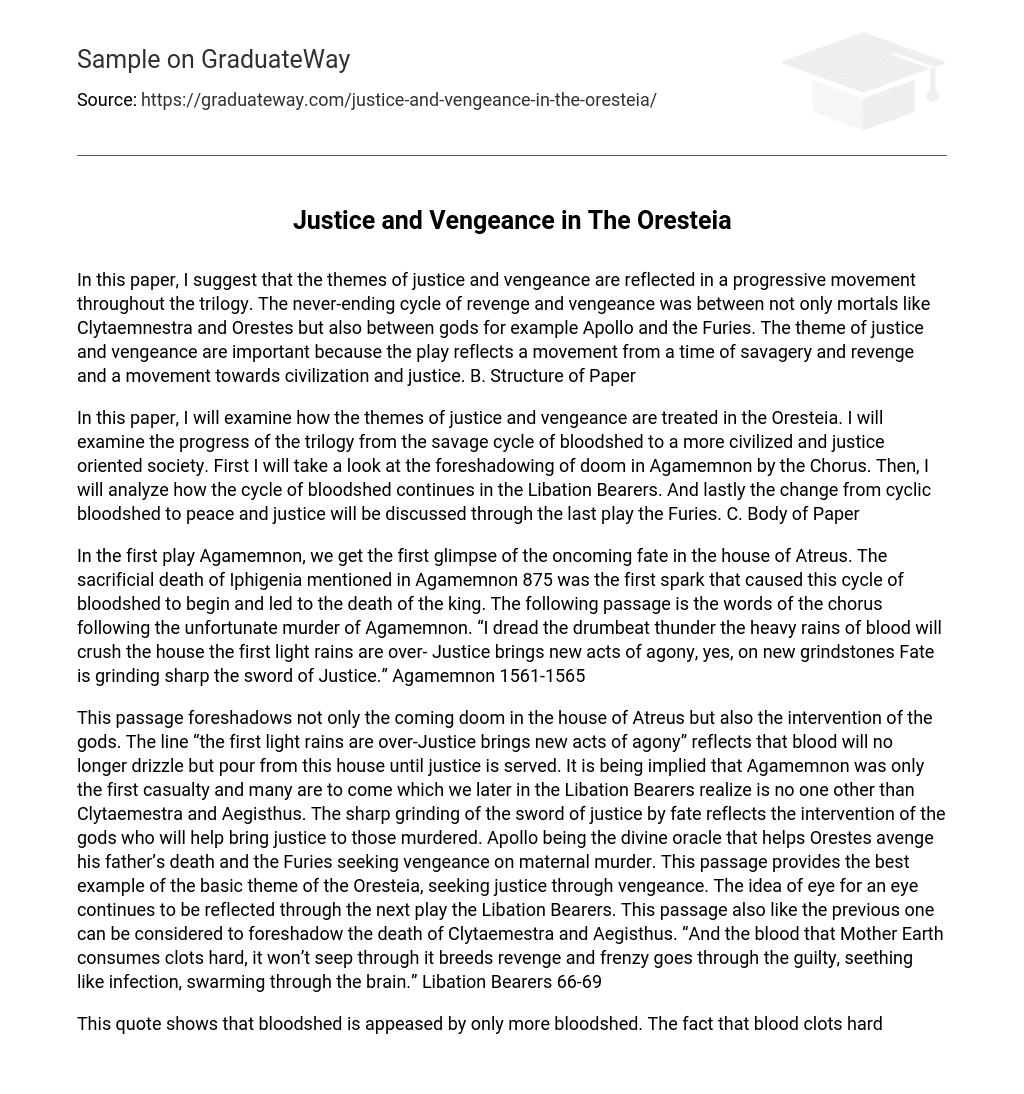In this paper, I suggest that the themes of justice and vengeance are reflected in a progressive movement throughout the trilogy. The never-ending cycle of revenge and vengeance was between not only mortals like Clytaemnestra and Orestes but also between gods for example Apollo and the Furies. The theme of justice and vengeance are important because the play reflects a movement from a time of savagery and revenge and a movement towards civilization and justice. B. Structure of Paper
In this paper, I will examine how the themes of justice and vengeance are treated in the Oresteia. I will examine the progress of the trilogy from the savage cycle of bloodshed to a more civilized and justice oriented society. First I will take a look at the foreshadowing of doom in Agamemnon by the Chorus. Then, I will analyze how the cycle of bloodshed continues in the Libation Bearers. And lastly the change from cyclic bloodshed to peace and justice will be discussed through the last play the Furies. C. Body of Paper
In the first play Agamemnon, we get the first glimpse of the oncoming fate in the house of Atreus. The sacrificial death of Iphigenia mentioned in Agamemnon 875 was the first spark that caused this cycle of bloodshed to begin and led to the death of the king. The following passage is the words of the chorus following the unfortunate murder of Agamemnon. “I dread the drumbeat thunder the heavy rains of blood will crush the house the first light rains are over- Justice brings new acts of agony, yes, on new grindstones Fate is grinding sharp the sword of Justice.” Agamemnon 1561-1565
This passage foreshadows not only the coming doom in the house of Atreus but also the intervention of the gods. The line “the first light rains are over-Justice brings new acts of agony” reflects that blood will no longer drizzle but pour from this house until justice is served. It is being implied that Agamemnon was only the first casualty and many are to come which we later in the Libation Bearers realize is no one other than Clytaemestra and Aegisthus. The sharp grinding of the sword of justice by fate reflects the intervention of the gods who will help bring justice to those murdered. Apollo being the divine oracle that helps Orestes avenge his father’s death and the Furies seeking vengeance on maternal murder. This passage provides the best example of the basic theme of the Oresteia, seeking justice through vengeance. The idea of eye for an eye continues to be reflected through the next play the Libation Bearers. This passage also like the previous one can be considered to foreshadow the death of Clytaemestra and Aegisthus. “And the blood that Mother Earth consumes clots hard, it won’t seep through it breeds revenge and frenzy goes through the guilty, seething like infection, swarming through the brain.” Libation Bearers 66-69
This quote shows that bloodshed is appeased by only more bloodshed. The fact that blood clots hard rather than seeps through signifies that death is something that is not easily accepted in human nature it only induces more revenge. The seething like infection also indicates that this feeling of vengeance will only spread like wildfire until the urge is satisfied. Orestes, with the support of Apollo, is the one reflecting this urge of vengeance while his guilty mother and her lover are the ones to lose their blood next. Clytamestra’s death causes the Furies to hunt Orestes and seek justice for her which leads us to the last part of the trilogy. In Eumenides 485, Athena decides that the case between Orestes and the Furies should be judged by a jury of mortal men. The verdict set Orestes free which enraged the Furies but for their appeasement Athena offers a place in Athens for them which they eventually agree to. Thus the following passage helps us understand how the cycle of vengeance was concluded. “Come and sped beneath the earth by our awesome sacrifices, keep destruction from the borders, bring prosperity home to Athens, triumph sailing in its wake.” The Eumenides 1015-1020
This quote depicts what Aeschylus was advocating at the end of the Furies. This verse spoken by Athena indicates that justice has been served and no longer should cycles of bloodshed and revenge be at the forefront. Rather the people of Athens should focus on bettering their homeland together and live in peace and harmony. The destruction should be put to better use by conquering foreign lands. The alliance between Athena and the Furies is the triumph being referred to in the end and also indicates that similar achievements should continue to prosper. As we can see the themes of justice and vengeance are at the forefront in the play. The trilogy reflects a progressive movement from revenge to justice. The sacrificial death of Iphigenia was the root cause of conflict between Clytaemestra and Agamemnon and eventually the unceasing cycle of bloodshed. However, the vengeance of Orestes and the Furies led to a final ruling that helped end the cycle. Although the house of Atreus was reduced to almost nothing through all the bloodshed the cycle helped erase the law of blood for blood and in turn peace and harmony were advocated.





